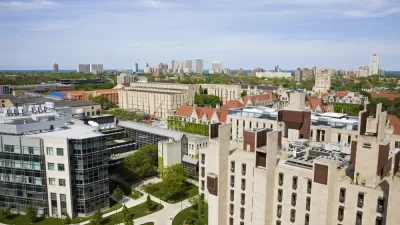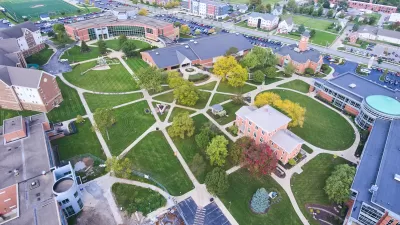Despite the improving economy, the outlook for the higher education sector is still poor, especially between the endowment haves and have-nots. Another factor playing a critical role in the success or failure of institutions: their location.

"What’s long been said about real estate is increasingly true for colleges as well—it’s all about location," reports Jeffrey Selingo.
Although education institutions have provided economic development opportunities in many urban areas, colleges and universities in rural areas are in danger of being left behind. "We are seeing creative juices and financial rewards flowing to a more select group of cities and urban areas. This has significant consequences for colleges in struggling towns and declining manufacturing cities," writes Selingo.
Remaining relevant and competing in an urbanizing country, according to Selingo, is "a task that colleges in those struggling towns often can’t afford." To make the case for the uncertain economic situation of higher education, Selingo cites a report released earlier this month by Moody's Investor's Services issuing a negative outlook for the higher education sector in the United States. In fact, the location of many colleges correlated to their financial performance. According to Selingo, "the credit-rating agency found that a quarter of regional public institutions—usually located in sparsely populated areas of their states—saw declines last year in their net tuition revenue, the cash that colleges have left after giving out financial aid to students. Among private colleges, Moody’s found 'a growing disparity between tuition-dependent colleges and market-leading universities with diverse revenue sources.'"
FULL STORY: Location, Location, Location. Urban Hot Spots Are the Place to Be.

Maui's Vacation Rental Debate Turns Ugly
Verbal attacks, misinformation campaigns and fistfights plague a high-stakes debate to convert thousands of vacation rentals into long-term housing.

Planetizen Federal Action Tracker
A weekly monitor of how Trump’s orders and actions are impacting planners and planning in America.

In Urban Planning, AI Prompting Could be the New Design Thinking
Creativity has long been key to great urban design. What if we see AI as our new creative partner?

King County Supportive Housing Program Offers Hope for Unhoused Residents
The county is taking a ‘Housing First’ approach that prioritizes getting people into housing, then offering wraparound supportive services.

Researchers Use AI to Get Clearer Picture of US Housing
Analysts are using artificial intelligence to supercharge their research by allowing them to comb through data faster. Though these AI tools can be error prone, they save time and housing researchers are optimistic about the future.

Making Shared Micromobility More Inclusive
Cities and shared mobility system operators can do more to include people with disabilities in planning and operations, per a new report.
Urban Design for Planners 1: Software Tools
This six-course series explores essential urban design concepts using open source software and equips planners with the tools they need to participate fully in the urban design process.
Planning for Universal Design
Learn the tools for implementing Universal Design in planning regulations.
planning NEXT
Appalachian Highlands Housing Partners
Mpact (founded as Rail~Volution)
City of Camden Redevelopment Agency
City of Astoria
City of Portland
City of Laramie





























